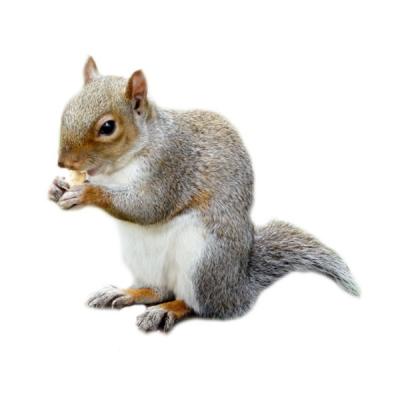Squirrel Control
Originally introduced from America during the late nineteenth and early twentieth centuries, the grey squirrel has spread widely and today is a well-known feature of British parks, gardens and woodland. The grey squirrel has pushed the UK’s native red squirrel near to extinction in all but a few places, in under a century.
As a result, grey squirrels are regarded as a pest especially if they choose to nest in your premises.
People think that squirrels are cute and cuddly but they actually cause more problems than rats. Squirrels are very determined creatures and once they enter your loft it is very difficult to get them out and keep them out. Rats, on the other hand, tend to enter lofts by accident and don’t normally try to find their way in again.
Squirrel problem?
Squirrels like to build nests in warm, secure places - like your loft or chimney where they can chew through water pipes and electric cables.
If squirrels get into these spaces they can chew through water pipes or electric lighting cables, causing chaos.
Electric cables chewed by squirrels are a common cause of house fires. Like rats, squirrels have ever-growing incisor teeth and the best place for them to gnaw when they are in your loft is the roof timbers causing thousands of pounds worth of damage.
They are a pest that Cleankill staff hate most as there have been several occasions when heavily gnawed and weakened roof joists in lofts have nearly resulted in employees falling through ceilings!
Thoroughly blocking up any likely holes and gaps will help prevent squirrels from entering the building, but only if it is done properly.
Squirrels are also a serious forestry pest, causing considerable damage to trees each year, especially to saplings. Individual trees in the garden can be protected by fitting specialist metal collars or sleeves, but this is really only possible on mature trees, which will not be growing fast, as a tight fit is essential.
Contact us today for more information and advice about squirrel control & removal services >
Fun facts about squirrels
- Mother squirrels are sometimes cannibals. A mother squirrel confined in an attic without food or water may eat some of her pups so she can sustain the rest.
- Most ground squirrels kiss when they see other. Mouth-to-mouth and mouth-to-nose contact is common when ground squirrels in the same social unit meet.
- Squirrels have excellent peripheral vision enabling them to remain motionless but clearly see a potential predator above, below, or to the side.
- Squirrels may make nests out of the insulation in attics and walls, reducing energy efficiency of a home.
- Contrary to popular belief grey squirrels do not hibernate during the winter but they may become less active.
- They reach maturity at 10-12 months and can have 3-4 litters a year with usually 3 young per litter. Average life span is 2 years.
- The grey squirrel can leap more than 6 metres!
- Although grey squirrels have a wide range of calls, they communicate mainly through their tails, using them as a signalling device; they twitch their tails if they are uneasy or suspicious.
